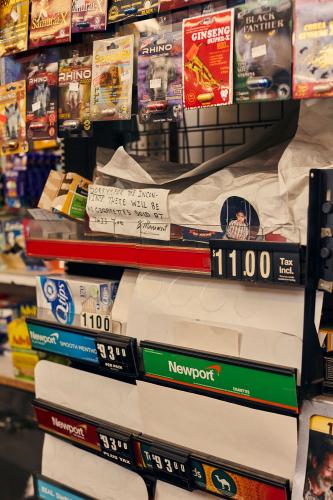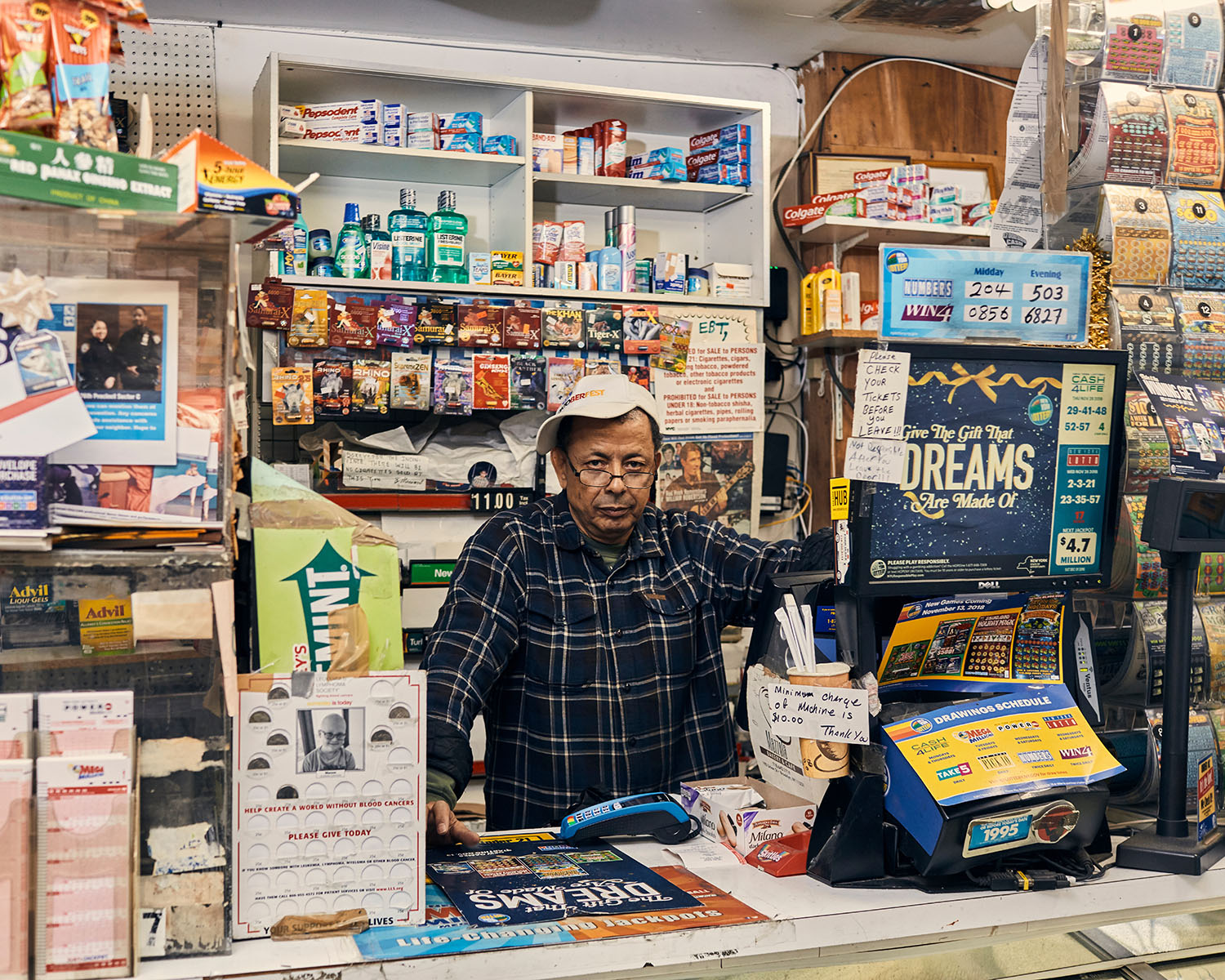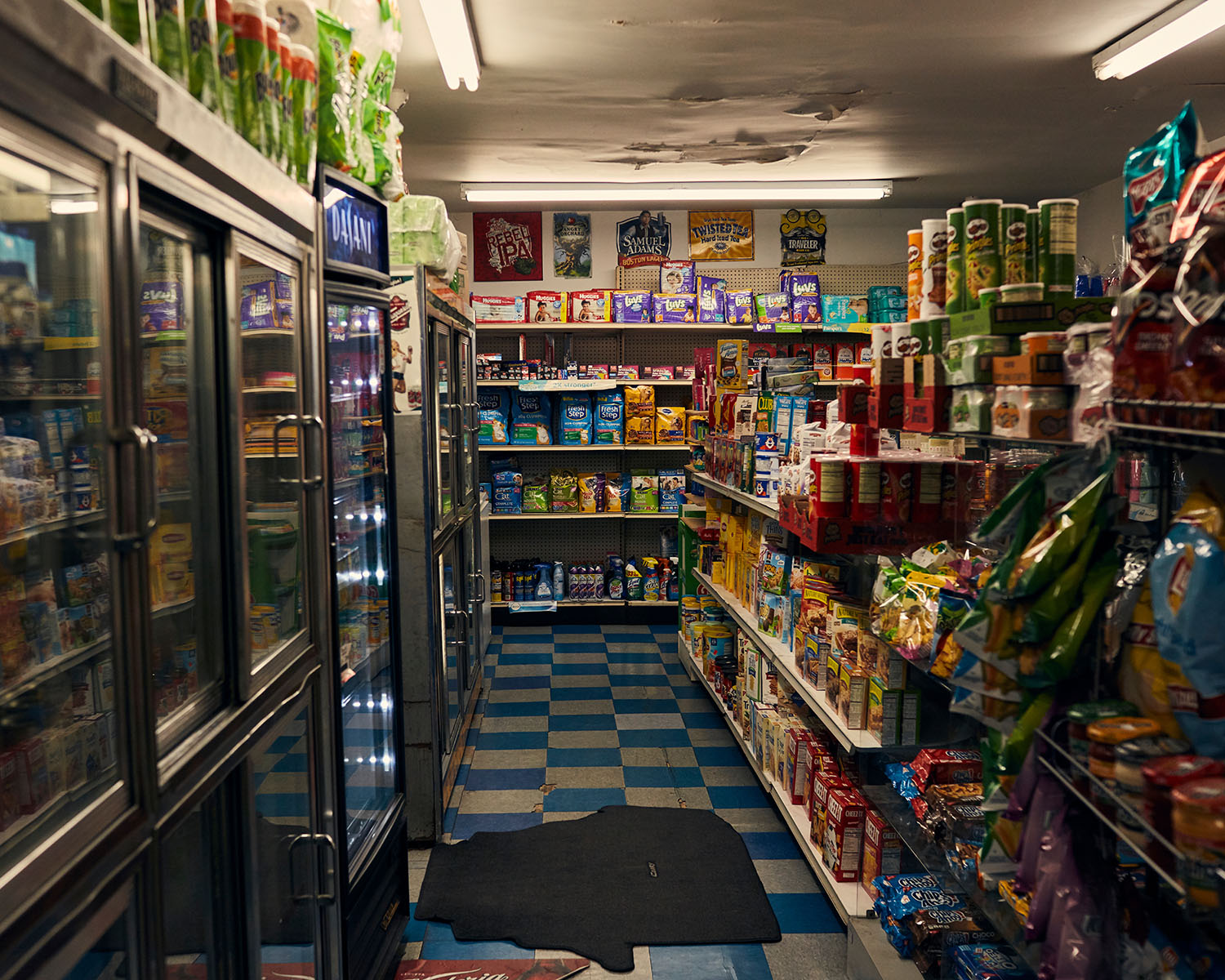1.
Kimo is early, anxious. He propped open the doors of his bodega hours ago, left his oldest son, Mohammed, behind the counter. Now he’s outside the Department of Consumer Affairs, which doesn’t open for another forty-five minutes. Nine-to-fivers hustle past. The sun has not yet struck the last of Broadway’s thirteen miles.
Kimo’s lawyer texts: She can’t make it, but her lawyer husband can. He’ll ask if the charge—selling cigarettes to an underage person—can be dropped, or dismissed, or simply fined away. “It’s all money,” he says. If not, Kimo will be sent to a judge who will decide what he can and can’t sell, how much between the bodega’s net and gross he can spend.
One day last summer, Mohammed kept the store while his father went to jury duty (the evening-shift guy couldn’t cover). Mohammed was alone, between political-science classes at college. A young man came in and asked for a loosie. But they don’t sell single cigarettes. The young man—big, angry—hulked out the door, then came back, swift and demanding. “Newports,” he said. Mohammed paused, then pulled the pack from the display and handed it over, put the money in the register. The man left, which was what Mohammed wanted him to do.
Mohammed knows what’s what. He grew up in that bodega. The neighborhood is gentrifying so fast you can hear it—the drilling and hammering—but not long ago it was rough, and sometimes still is. Mohammed’s seen his father get bitched-out and spit on by customers. Seen his father hand a hot cup of coffee to a customer and have it thrown back in his face. The store’s been robbed twice. And, well, his name is Mohammed. This is partly what has made him a shy, sweet, nonconfrontational kid.
A few minutes after the Newports went out the door, Inspector Felix Negron came in: A citation would arrive in the mail. Ashamed, afraid of what this meant for the store, Mohammed didn’t tell his father for days, then disappeared. Kimo eventually found him at a friend’s in Manhattan.
The charge sticks. If his license is taken, that’s one year’s cut into Kimo’s income—plus the paperwork and time it takes to get it back. “I serve our community,” Kimo tells me, “but this is a hard business to live by.”
2.
 Decreasing the number of smokers in New York is a burden the city’s 13,000 bodega owners bear. “These new laws will not only help reduce the number of smokers in our city, but also save lives,” Mayor Bill de Blasio said in August 2017. The city has the second-highest cigarette tax rate in the country: $5.85 with state and local fees.
Decreasing the number of smokers in New York is a burden the city’s 13,000 bodega owners bear. “These new laws will not only help reduce the number of smokers in our city, but also save lives,” Mayor Bill de Blasio said in August 2017. The city has the second-highest cigarette tax rate in the country: $5.85 with state and local fees.
Every smoker tries to find ways around the taxes. Quitting’s a bitch. Making cigarettes more expensive also makes them more precious, harder to give up. Cigarettes are rent-paying items for bodega owners. Store margins are slim.
It’s illegal to sell cheaper out-of-state cigarettes; it’s illegal to sell loosies; it’s illegal to sell to anyone under the age of twenty-one. But the price of a single pack of Newports at Kimo’s bodega is now $13.
If you are addicted to nicotine but can’t cough up $13 a day, what do you do? And if you’re a city official, how do you enforce the law? You employ a swarm of inspectors who operate like a cross between plain-clothes cops and street thugs, if Inspector Felix Negron is any example. He’s Kimo’s example. // Kimo’s name is Kamal Elsayed. He grew up on Al Hayeti Street, which, like all streets in Alexandria, Egypt, is a short walk from the water. In 1988 he moved to Sheepshead Bay, Brooklyn. A whole new everything, half a life ago. He worked construction jobs, then washed cars. He was a delivery man, a chef, a restaurant manager, then a Starbucks manager. In 2000 he married and had two boys.
“I keep my name nice and clean,” he says, “not for me but for my kids.” Good kids. Mohammed will soon graduate from college; Omar wants to be a judge.
Kimo, of course, remains all-in on the American dream. Seven days a week he gets out of bed in the dark to sell coffee and beer, cigarettes and cat food, to wrap cinnamon rolls in cellophane, give candy to children, to pull bananas from bunches and arrange them in a basket, as neatly as quarters in a paper roll.
3.
Inspector Felix Negron is a Harley man, bulky, bald, dressed in black, Fu Manchu. Under the lights in the hearing room he looks severely sleep deprived—or something. He keeps rubbing his face like he’s bored. “If you don’t own a Harley—Don’t blame your wife for dating someone who does,” a photo on his Facebook page reads. “I’m not always an asshole,” another reads, “Just kidding go fuck yourself.” He’s intimidating. He works at it.
“He will be watching you,” the lawyer tells Kimo as they leave the courthouse. “Did you see his eyes?” Kimo asks.
The hearing decision arrives in the mail on October 5. The young black man Mohammed sold the Newports to was nineteen, it says, according to “a redacted copy of the undercover operative’s birth certificate, on which the undercover’s initials ‘T. O.’ and birth year of 1998 were visible.” On the next page it states that he was twenty.
“I find that respondent failed to successfully rebut the charge [that Mohammed was not coerced or intimidated] and is in violation.” Kimo has no camera footage of the sale because Mohammed kept it from him for weeks and then disappeared. The camera erases its memory every thirty days. Kimo understands that Mohammed broke the law, but he also knows that a lot falls between the law and his obligations. He has to be better than others because he is Muslim—always suspect, always under vigilance. He has to work harder to prevent his sons from working ninety-hour weeks, like he does. The bills pile up, the bodega’s profits fall.
Kimo wonders if inspectors might be targeting his son; this is the second time Mohammed has sold cigarettes to an underage informant. The first time, Kimo was at the doctor’s office having his heart examined.
“Why don’t you fire Mohammed?” the judge asked, twice. “He is my son,” Kimo patiently repeated.
The rows of cigarettes behind the counter are now covered with sheets of white cardboard. Kimo’s regulars are rerouted by necessity, by new habits. They shop elsewhere.
This dispatch is from #VQRTrueStory, our social-media experiment in nonfiction, which you can follow by visiting us on Instagram: @vqreview.









